Robotic Process Automation Use Cases with Examples

RPA, bots– The newest and the most emerging kid in the field of technology. Back in the day, we would always imagine how great it would be if someone would take up the strenuous job of entering a large amount of data or to do the same task multiple times and then all thanks to the great technology we have, it gave us something called ‘Robots’.

Table of Contents
Let us look into what is RPA?
RPA is using software with artificial intelligence and machine learning to carry out specific jobs which are repetitive, tedious and also time-consuming. They are robots basically, and any user can interpret the software according to the work requirement. These robots make use of the user interface, capture the data, and just like humans, they can even interact, interpret the data and perform many other repetitive tasks which saves time.
If we look at the current IT infrastructure RPA(Robotic Process Automation) fits in perfectly and it does not require any additional installations which are also one of the reasons why a lot of companies are now using RPA. The most significant advantage of RPA in any business enterprise is that
RPA is that software which can mimic or do all possible human actions. It can move files, communicate with other systems, log into applications, fill in forms, extract data; in other words, do all the jobs which do not require human interaction or presence.
RPA can be classified into three categories:
|
|
|
Benefits of using RPA:
Using bots in the organisation can benefit the company in many different ways.
- Customer Satisfaction– Customer satisfaction is one of the most important factors in the company’s growth. Using this Bots for initial customer interaction can speed up the process which makes dealing with the issue easy. It’s very simple quicker the response, happier the customer.
- Improved efficiency– Efficiency automatically improves as these bots digitize and audit the data. Also as they do the job as programmed the chances of errors are lesser which results in better efficiency.
- System compatibility– If a company wants to implement RPA they can do it easily because they are designed by the UI path and they do not interfere with the companies legal system and are compatible enough to sit on the top of the IT infrastructure.
- Cost management(savings)– Once these bots are installed in the company we can program them in such a way that all the repetitive jobs can be done and also reduction in errors helps the company save a little more.
- Increase in productivity– Employees can be diverted to do more productive work. The repetitive, strenuous, monotonous jobs of the employees which are taken up by the bots can be diverted into more productive streams. Thus which again leads to more productivity and more customer satisfaction.
- Speed up in process completion– RPA helps in allowing the processing of data more rapidly. For example in the field of Insurance underwriting takes much less time now. Even in the IT industry in the HR department, all the process are now quicker because of automation than what it was when everything was manual.
RPA or automation in an organisation can be advantageous in so many other ways such that the organisation can focus less on paperwork and more on productivity.
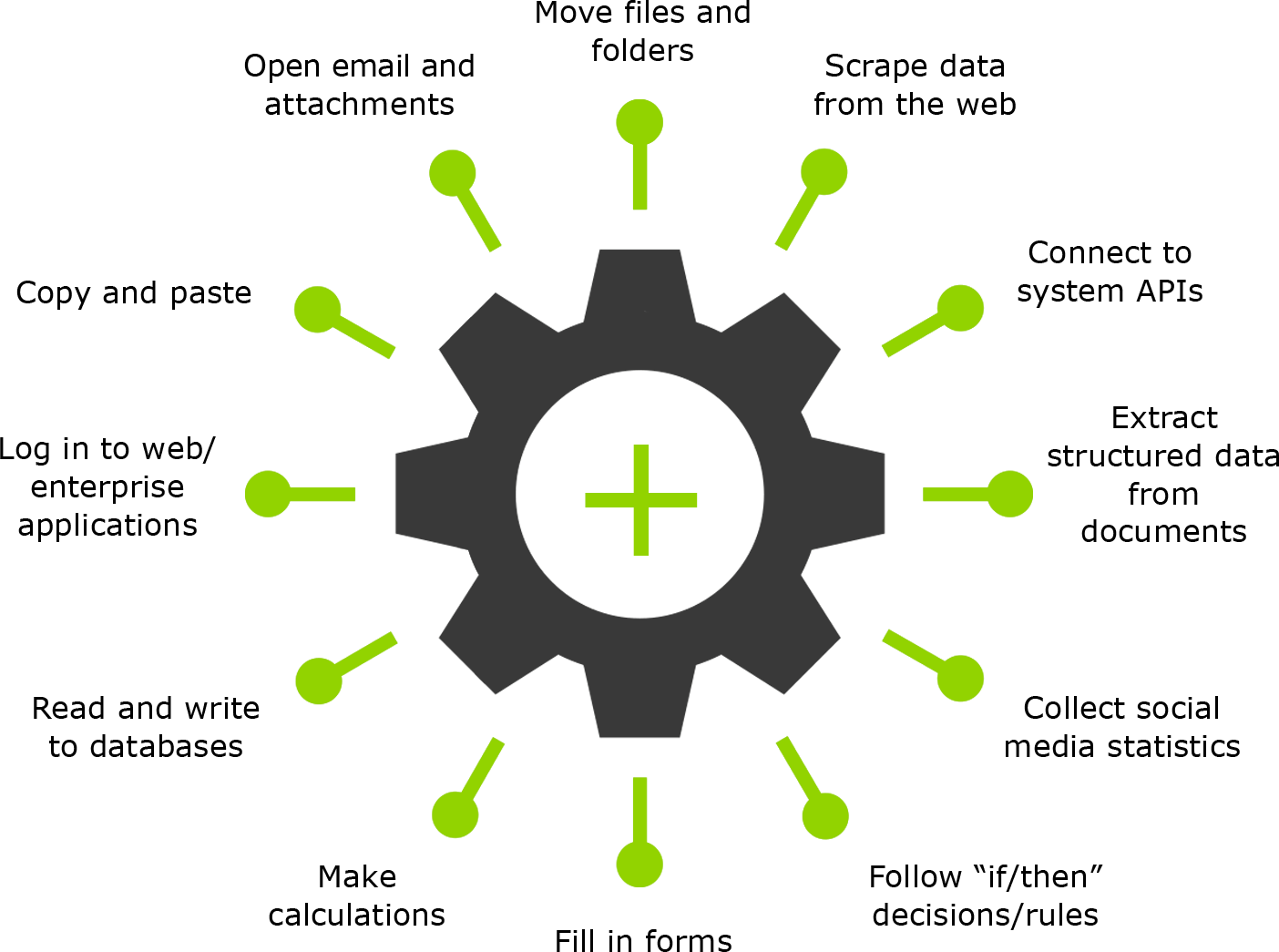
- Log into any application, store and retrieve the data
- Read and write to any database
- Move files and folders with in the system
- Search the Web
- Connect to system API’s
- Extract data from PDFs, Documents
- Open Emails, reply to the emails.
Where can we use RPA?
RPA’s can be used in various fields and majorly in the places where it does not require much of the human presence.
Retail Industry
- Automate invoice processing
- Inventory management
- Sales Analytics
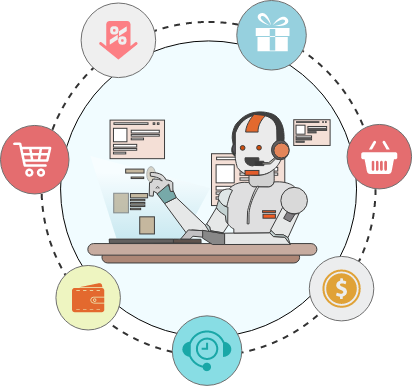
The advantages also include consumer behaviour, an employee on board, efficient customer support and many more. The biggest advantage of having RPA in the retail industry is that it helps the business to grow. According to a report, global retail sales are about to reach $27.7 trillion by 2020. There is something called the ‘price war’ in the e-commerce and retail businesses and so all these companies are now focusing on ‘customer satisfaction’,’ availability of the product’ and ‘reduction in cost’.
RTA comes into play because these retail businesses have a huge stock of processes like:
- Invoice processing
- Customer queries
- Order processing
- Business analytics
- Sales Management
- Employee onboard and offboard
Advantages of having RPA in retail is
- It helps to know the customers better, their preferences, purchases which can help the company give future suggestions
- It helps reduce cost and errors in business operations
- It helps us know the trend in the market for future product launches
- Real-time analysis in the field of sales and inventory for efficient future planning
- Smarter promotions which bring more value to the customer
Thus in this way, RPA is playing a major role in changing the retail industry
Insurance industry
- Underwriting and pricing
- Processing claims
- Policy Administration and Servicing
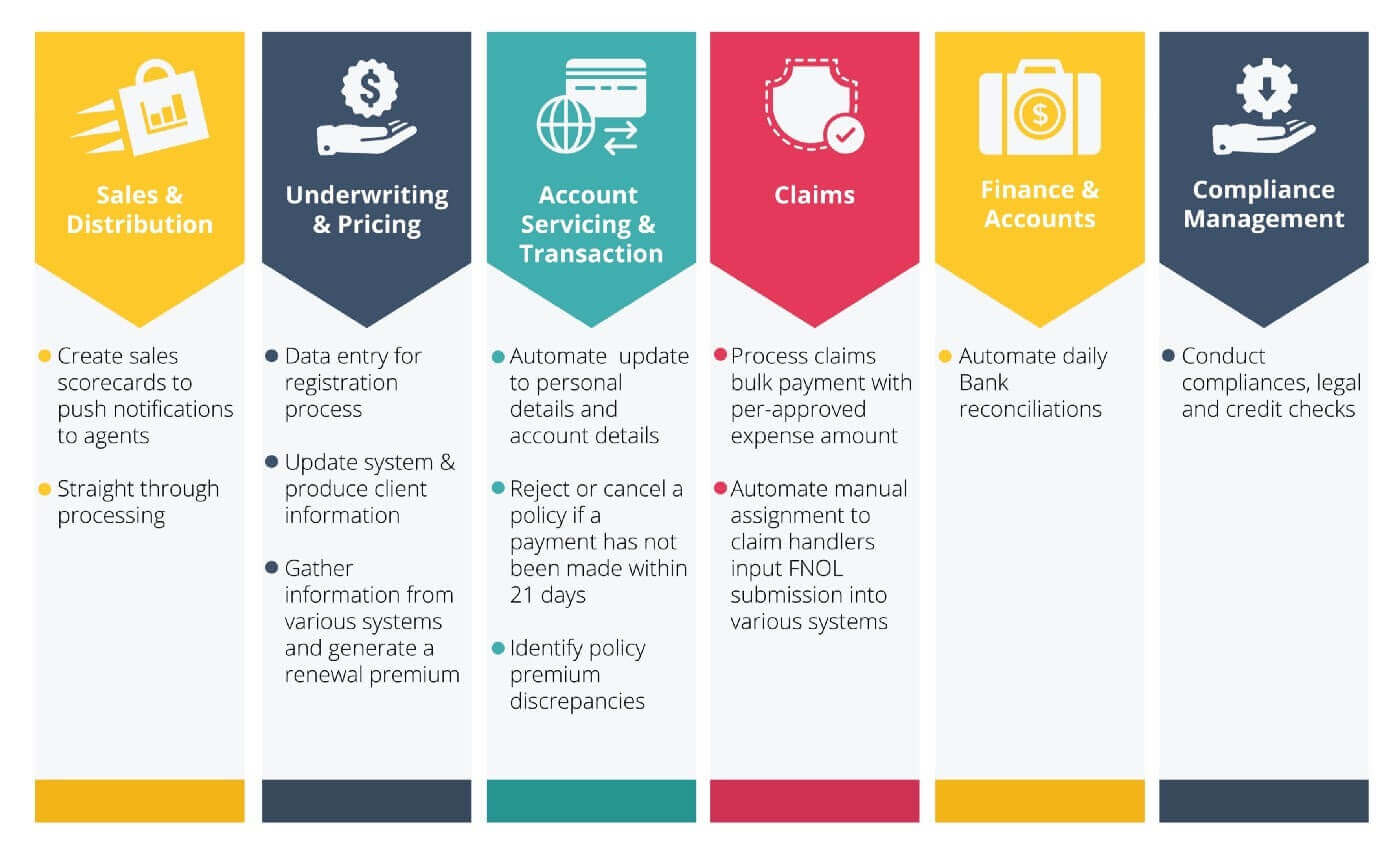
Automation in the field of insurance is a commendable way of dealing with the clerical and monotonous jobs which actually do not require any human intervention. There are multiple challenges which the insurance company has to face like
|
Legacy applications |
Input from various sources manually |
Maintaining regulation and compliance |
Insurance Claim Processing: RPA in insurance claim processing boosts the workflow by integrating different claim processing information from various sources which benefits the company. Automation allows companies to upload the electronic version of the bank statements and then process it to the system using matching rule.
Underwriting and pricing: Underwriting is basically gathering information from different sources and then analyzing the risks in a specific policy. So, to collect, analyze, process and to foresee the data takes a lot of time. Implementing RPA improves efficiency in insurance underwriting. It automates the process of gathering information from various internal and external sources which saves a lot of time. RPA is used to even produce reports
Banking industry
- Accounting
- Customer service
- Fraud detection
- Credit card processing
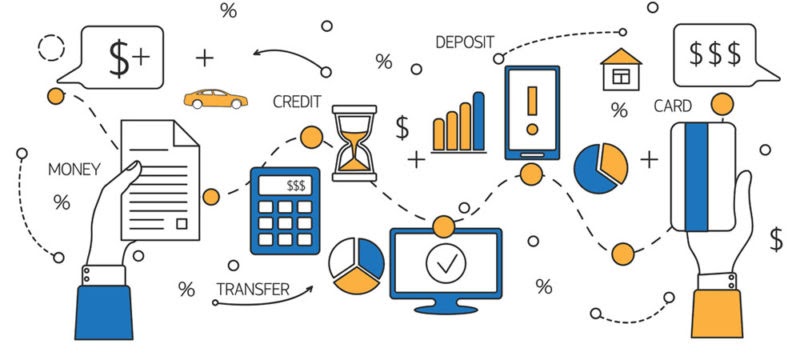
These are a few examples listed above. The banking industry needs RPA because the amount of data the bank employees receive on a daily basis is humongous and to manage them is a big task while doing so there is a chance of having some human errors. Now if we place bots in this particular role or any other role for that matter they do the work in a quicker time with no.
Automation in the field of banking has the power to streamline the entire customer onboard experience Banks can use RPA to automate the process of information transfer from
Customer → Bank
Bank → Customer
Keeping the same thing in mind one of the largest banks in Japan has implemented RPA to gain efficiency and save labour cost. Some famous banks like AXIS and Deutsche have also made news for implementing RPA.
Let us look into some of the examples given by the report in 2018 by Deloitte Automation in Onboarding and Ongoing Servicing of Commercial Banking Clients
- Filling in forms
- Connecting systems through API’s
- Performing arithmetic calculations
- Extracting structured data from documents
- Moving files and folders
- Extracting data and preparing reports and dashboards
- Database reading and writing
Automation in the banking field makes a lot of impact on bringing more growth.
Sales Industry
- Competitive price monitoring
- Sales data processing
- Creating and delivering invoices
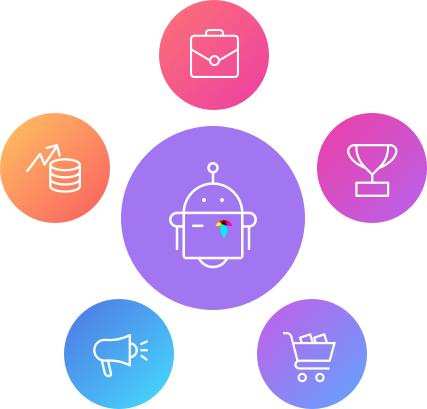
Sales industry is huge with large amounts of data. The sales representatives have to spend half of their time entering the data, data governance, cleaning up the CRM systems. They also have to enter the data into the CRM as well as the ERP system which consumes half of their time. Finance analysts have to then enter the same data into another module. This entire process might result in errors and thus this affects productivity. Now this is where RPA comes into play, if we place a bot in these time consuming, tedious and repetitive jobs then there will be less errors, duplicate data will be deleted which leads to more customer satisfaction and productivity.
RPA in sales can also be used in the following ways
- Forecasting – RPA with AI actually help in predicting the future sales correctly which will benefit the company in many ways
- Campaign management – RPA can bring efficiency in campaign management which leads to higher sales
- Customer Relationship Management (CRM) – RPA plays a very important role in CRM. It can be used for automating tasks such as customers order, order tracking, shipment tracking,updating customer info, customer queries and also issues regarding their orders
- Market research – RPA can be used to conduct market research to improve the sales. RPA can help the sales team to gather insights regarding the market conditions, pricing of the competitors etc which saves a lot of time for the sales team
IT Industry
- Payroll processing
- Onboarding
- Processing HR information
- Timesheet submission

RPA in the IT industry takes a major role in the HR department. True to the fact that every organisation has a HR department and the bigger the business, the larger its HR department. Thereby this leads to more processes for the department to manage. All the above mentioned
tasks can be handled by the RPA like a pro. So basically jobs like filling up the employee details, recruitment, issues related to employees like claims for expenses, tasks like these are time consuming. If RPA is placed to do these jobs then the efficiency, accuracy of the IT department increases.
If RPA is combined with NLP(Natural Language Processing) then we can call them ‘Chatbots’. These bots can interact with the employees, they will act more like the virtual assistants which will help them in various jobs.
Manufacturing Industry
- Bill of Materials
- Administration
- Data Migration
- Logistics
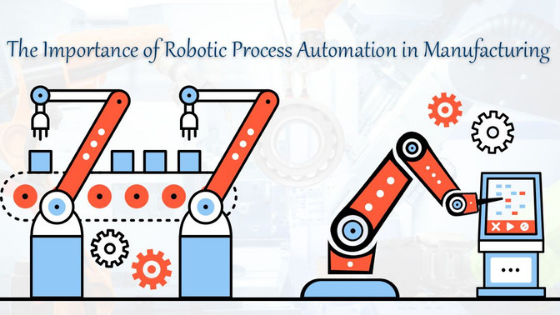
We know for a fact that the manufacturing industry is huge and requires a good amount of employees which also might result in human errors and also is time consuming. Now if we use RPA in the place of these employees there will be a paddle shift in the way the entire process works.
Manufacturing companies are now replacing humans with bots for checking the quality, to assemble and also in packing. We all know that in all the manufacturing companies bots are being used extensively but we should also know for a fact that these bots can also help us in the backend work.
Let us look at some advantages of having bots at the back end apart from the ones mentioned above.
- Purchase order Creation: Manufacturing companies have to deal with some n number of vendors where each vendor creates a different PO and that too on a regular basis.So, if we assign RPA for such a job then the entire process can occur in less amount of time with no errors.
- Automated ERP: The main advantage of RPA in ERP is that it can
-
- Process and verify invoices present in different systems
- Send it to the accounts department for payment
- Check the payment status
- Thus, this leads to business efficiency
- Integrated systems: Manufacturing companies tend to use multiple systems at different locations as per the requirement which leads to more number of systems with huge amounts of data. If we place RPA here, it helps for systems which aren’t compatible with each other to integrate which then helps in reporting.
As we have seen all the Pro’s so as to why RPA is sweeping every industry off their feet. Let us now peep into some companies who have actually implements RPA in their businesses.
- Walmart
- Deutsche Bank
- AT&T
- Vanguard
- Ernst & Young
- Walgreen
- American Express
Few IT Companies who are using ‘Blue Prism’ as RPA tools are:
- Cognizant
- Accenture
- Capgemini
- Deloitte
- Genpact
- IBM
- TCS
- Tech Mahindra
Walmart CIO has stated that the biggest retail giant has employed 500 bots to do anything and everything from retrieving data to answering questions from employees.
RPA is the game changer. According to McKinsey & Company the automation systems would undertake the work equivalent to upto 140 million jobs by 2025. Nevertheless, new jobs would be created to supervise and automate the processes.
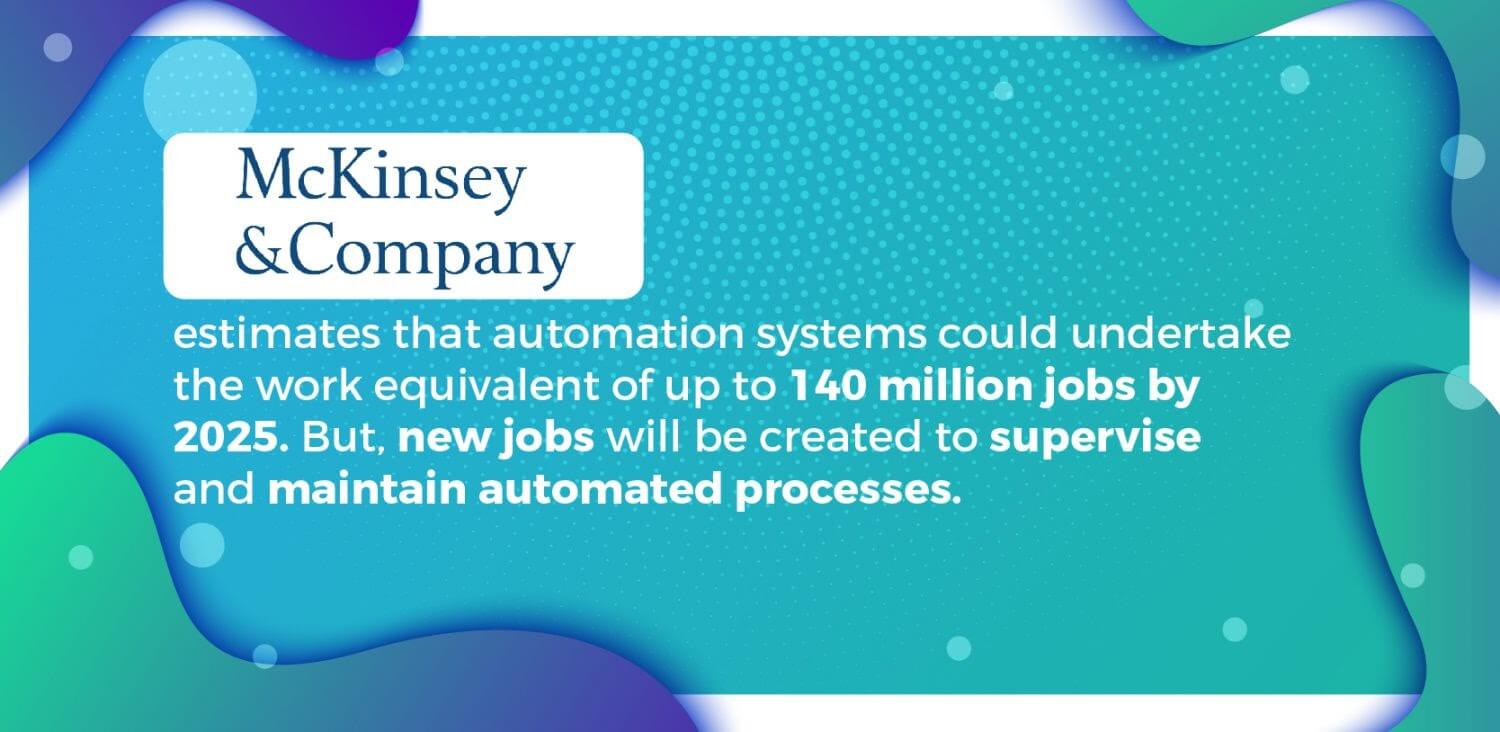
Now this looks like the future is just going to be with automation or let’s put it this way bautomation is going to enter into every field and touch every part of our lives so are they going to be our virtual best friends? We never know.
But the big question here is Will RPA replace millions of jobs?

Let’s get this straight, RPA’s have been designed in a way where they can work along with humans which means bots and can co-exist. Both can work side by side. The World Economic Forum says ‘Automation and digital transformation reduces various job roles by 2022 but at the same time it will also create new jobs. So, there will be a rise of almost 80% in the jobs so as to the current job market’.
The report also states ‘By 2022, there will be 16% to 27% growth in newly emerging occupations of employees in large firms. Also, 75 million current job roles will be equally distributed among humans, machines and algorithms and also 133 millions new job opportunities may emerge.
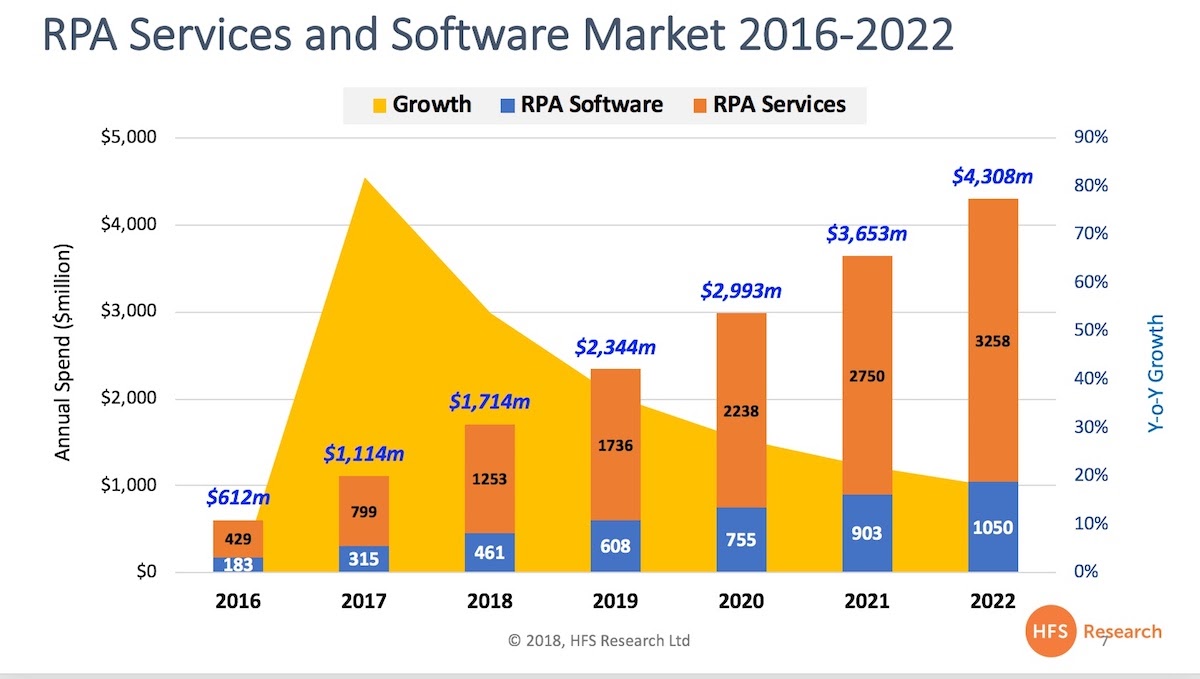
Let’s look at the stats about the ‘Growth’ , ‘RPA software’, ‘RPA services’.

Technology is growing everyday and we have to enjoy the fruits of it and one of the most amazing discoveries of technology is automation which will make our lives easier, better and also increase a lot of productivity. Let us work hand in hand with these bots and build more productivity.
Author Bio:
Born and raised in Hyderabad, Tejaswi Pulijala completed her masters in computer science. Passionate about writing she worked previously in internships related to content writing and blog posting. Positioned as a content writer in Mindmajix, You can contect with him via Linkedin.




Nice article, thanks for sharing informative post.
Website is so easy to use – I am impressed with it. Thank you for sharing.